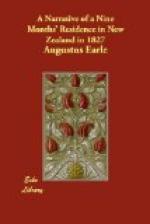He was arrayed in a new blanket, which completely enveloped his figure, leaving exposed his highly-tattooed face, and head profusely covered with long, black, curling hair, adorned with a quantity of white feathers. He was altogether a very fine study; and, with his permission, I made a sketch of him, and also one including the whole group. Finding we were newcomers, he asked us a variety of questions, and, among others, our opinion of his country. His remarks were judicious and sensible, and he seemed much pleased with our admiration of his territory. I produced a bottle of wine that I had brought with me, and his wife supplied him with a few glasses, which seemed to revive and animate him.
We were then invited to join him in a trip in one of his canoes, in which was placed a bed for him to recline upon; his wife seated herself close to him, while his daughter, a very pretty, interesting girl about fifteen years of age, took a paddle in her hand, which she used with the greatest dexterity. I took the liberty of presenting her with a bracelet, with which she seemed highly delighted; when Hongi, perceiving that I was in a giving mood, pointed to his beard, and asked me for a razor. Fortunately, I had put one in my pocket on setting out, and I now presented it to him, by which gifts we continued on terms of great sociability and friendship. After a pleasant cruise with this (to us) extraordinary family, and contriving to make ourselves pretty well understood, we returned about the close of the day, and landed at the bay. All the natives were much delighted at our confidence in them, and we were equally gratified by their hospitality.
CHAPTER XVII.
A MAORI WELCOME.
I was much amused with the punctilios used in the visit of ceremony paid to King George. Hongi, accompanied by about a dozen of his chiefs, advanced towards our settlement, leaving their guns and hatchets behind them; as they approached, all our tribe discharged their pieces in the air. When they met, all rubbed noses (a ceremony never to be dispensed with on formal occasions). They were then conducted by King George to his huts on the beach, and in the enclosure in front of them the warriors squatted on the ground. Hongi, being tabooed, or under the immediate protection of their Atua, or God, still sat apart. Then the mother of George, called Tururo, or the Queen, and who is regarded quite as a sybil by the whole tribe, approached Hongi with the greatest respect and caution, and seated herself some paces from his feet. She then began, with a most melancholy cadence (her eyes streaming with tears and fixed upon the ground), the song of welcome. All their meetings of ceremony or friendship begin with the shedding of copious floods of tears; and as Hongi’s visit was such an unhoped for and unexpected honour, so much greater in proportion was the necessity for their lamentations. This




